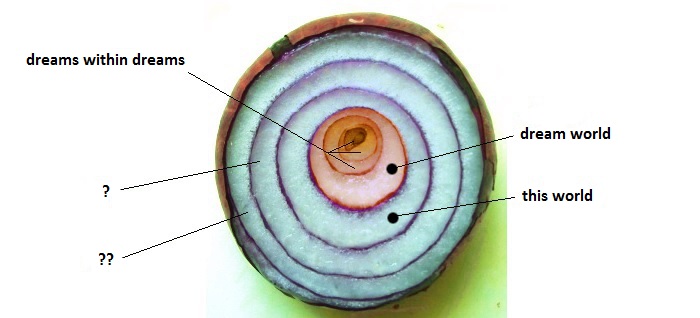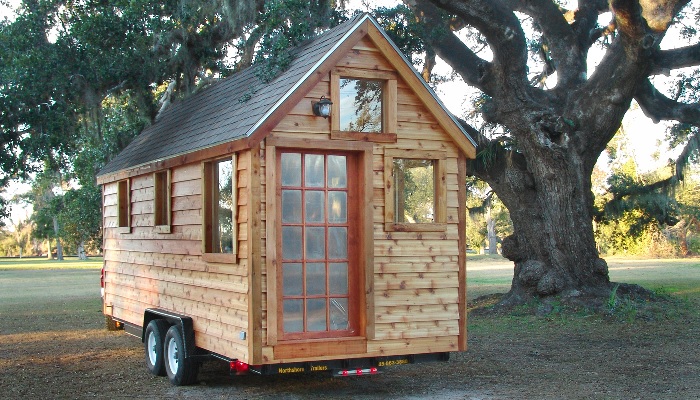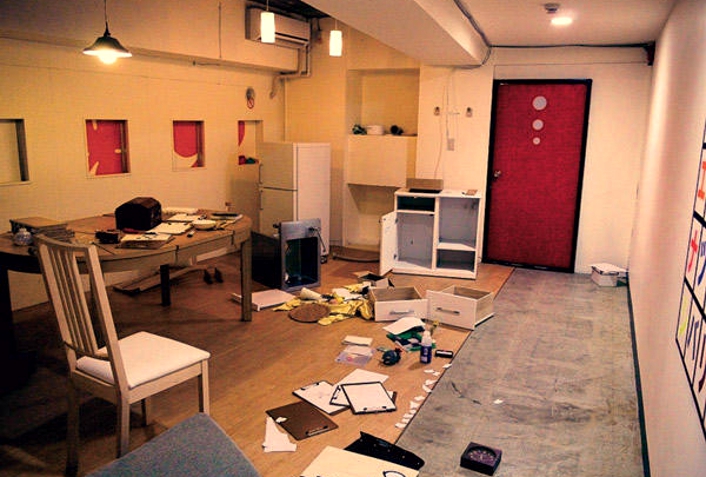Maybe you are already familiar with lucid dreams. It’s those dreams in which maybe you’re busy running away from a monster who is chasing you, or you are flying over a city, or maybe you’re simply traveling in the car with the family, but at a certain point you become aware that the situation is not real. Suddenly, a detail seems exaggerated to you, out of place, and that’s the trigger: you acquire lucidity and understand that you are inside a dream, instead of inside real life.
At this point two things can happen: the first is that you wake up immediately. And this is definitely the one that happens more frequently. In the moment you acquire lucidity the scenario crumbles and you leave the dream, returning to this world.
The second thing that can happen is that you don’t wake up, at least not immediately. Not waking up once you acquire lucidity is extremely difficult, but there is a huge prize for those who succeed: the possibility of exploring and especially manipulating the dream.
The nice thing about not waking up
I find it highly desirable not to wake up as soon as I acquire lucidity inside my dreams, and I definitely don’t think I’m the only one. In the world there is a number of people dedicated to oneironautics, who try to have lucid dreams more or less regularly, traveling inside of them and manipulating them at their will.
It’s not difficult to understand the motivation for this desire: inside a lucid dream you can make everything happen according to your will, really everything: from floating in the space, to chatting with a pharaoh of ancient Egypt, to casting lightnings from the hands. The limits of this world disappear, and yet at the same moment you “feel” things in an extremely vivid way: just like if they were real, even if you are aware that they’re not, since you are in a state of lucidity.
If as lucid you have flown in the sky, not constrained anymore by gravity that anchors you to the ground, or if you strolled freely under the seas, not forced anymore to have to breathe air, then you know well how wonderful the sensations that are felt are. And this is why probably you are enjoying it so much that the last thing you want to do is to wake up.
As for me, when I become lucid inside of a dream of mine I almost always rush to modify it and create a situation to have sex, which says a lot about how “highly spiritual” my deepest desires are. But when it happens, I always do it with some anxiety: I know that I could wake up in any second and lose all the fun.
I always tell myself: “keep calm, don’t agitate, don’t wake up”, but at the end I wake up typically within very few seconds, rather disappointed. The longest of my explorations/manipulations of dreams lasted maybe 10 or 15 seconds.
Having lucid dreams is difficult
The dimension of lucid dreams is extremely fascinating to explore, but still the problem of staying inside of them for more than just few seconds is already a successive problem. The main problem is having lucid dreams, in the first place. In fact usually only a minimal percentage of the dreams we have are lucid dreams.
In my case, I have good memories of the percentage of my dreams in which I acquired lucidity. For example, I remember clearly a dream I had some time ago in which I was running away chased by a monster, very scared, and there at a certain point I stopped thinking “ehi what the heck do I worry about? This monster can’t exist, this is clearly just a dream.”, so I relaxed and woke up, shortly after.
Unfortunately I rarely have this type of realization. Most of the times, inside my dreams, I’m so busy interacting with absurd characters or participating to the craziest adventures, that I really don’t notice that “something is wrong”. And when at the end of the sleep I wake up back in my bed, I am almost upset with myself: how couldn’t I notice that the situation was not credible!
What if dreams are meant to test us?
Many people, included me, wondered often why we dream.
It’s fascinating to think that dreams are a test that is given to us each night, that we pass only by realizing that we are dreaming, therefore entering in a different state of consciousness in which we have access to huge powers. And it’s fascinating to think that someone, or something, projects each night an illusion in our mind, leaving as clues some details out of place, and that it’s our task to notice those details to realize that we are being fooled.
It’s fascinating to think that dreams are not meant to make us sleep, but to make us wake up. But not necessarily wake up to return immediately to this world, but to wake up inside the dreams themselves, so that we can learn to use the power of creation that we have.
In fact, a possibility is that normal dreams, the non lucid ones, for us human beings are nothing else but the anteroom to a “training” field, the one of lucid dreams, in which we can practice our ability to create scenarios, people, creatures, situations according to our will.
Sounds familiar?
If you know what today is known as the law of attraction, maybe the parallel already came to your mind at this point. The law of attraction is the principle according to which we human beings create the reality that surrounds us with our thoughts. The world we have around is nothing else but the reflection of our inner world, and the job we have, the people we meet, the situations we encounter daily, they’re consequence of the thoughts that occupy our mind.
The law of attraction is very very popular, and today it has a huge number of fans, even if I have the impression that few people get results.
The reson in my opinion is that even if many say they believe it with words, almost trying to convince themselves, the truth is that deeply inside of them they don’t. And this is partially valid also for me: I believe in the law of attraction probably much more that the average of people, but still I am aware that I don’t believe it 100%, not yet at least.
For example, I believe to be strongly responsible for which people are present in my social life, and I believe that I have a huge decisional power on the amount of money I earn, and in general I believe that my life is in many ways wonderful exactly because I decided that I wanted it this way. But I still don’t believe that I can make matter apper with my thoughts. I could say that I believe it with words, and in a certain way I feel that “I’d better” believe it, but it would not correspond to what I feel inside. That are still some constraints in this world that seem to me still totally out of my control.
And yet I know well that inside my lucid dreams instead I can do everything, included materializing people and objects, and in fact I do it (having a lot of fun). So who knows, could lucid dreams actually be a demonstration? A demonstration that it’s possible to do practically everything, and that suggests the idea that we can follow a similar process also in this world, using the law of attraction.
What if also this world is meant to test us?
To the idea that two levels exist, the internal one of the dreams that we can successfully manipulate by becoming lucid, and the external one of this world that we can successfully manipulate by using our beliefs, naturally follows the idea to extend the structure and think that n levels could exist: others more internal to the one of dreams, and others more external to the one of this world.
 That levels internal to the level of dreams exist, we actually already know this: they’re embedded dreams, those we experience when we wake up from a dream and we find ourselves still inside a dream. So we were dreaming of dreaming. Also of these, technically called false awakenings, I had experience. And this is also the theme around which the movie Inception is developed, which is based on a very original idea, even if in my opinion it has been realized in a very confusional way.
That levels internal to the level of dreams exist, we actually already know this: they’re embedded dreams, those we experience when we wake up from a dream and we find ourselves still inside a dream. So we were dreaming of dreaming. Also of these, technically called false awakenings, I had experience. And this is also the theme around which the movie Inception is developed, which is based on a very original idea, even if in my opinion it has been realized in a very confusional way.
That levels external to the level of this world exist, instead, we don’t know it well. And yet the idea that this world could also be a dream, a sort of illusion, has already been suggested by many authors in many ways. The first ones that come to my mind: the book The little prince (what is essential is invisible to the eye), the books of Peter Kingsley (what isn’t there, in front of our eyes, is usually more real than what is), the movie The matrix (in which what many know are “reality” is instead a projection created by machines), the movie The Truman show (in which what the main character knows as “reality” is instead a projection created by other people).
If the idea with which these and many other works flirt is true, and therefore this world that we’re used to consider absolutely “real” instead is also just a sort of dream, the consequence is that the life we live inside of it can be seen in every aspect as a test, an enigma to solve, a riddle. And the first step to get to the solution is to see the illusion: to acquire lucidity here too.
Life as a riddle
Naturally, of the fact that life represents a giant riddle and that therefore our task is to solve it, this riddle, there is no evidence. And there is no evidence that this world that we perceive with our senses is only partial, and that there are external levels. It’s a fascinating speculation.
Choosing to believe that in life there is nothing to become aware of, or choosing to believe that in life there is something to become aware of: this is an absolutely personal decision, that all of us take more or less consciously, based exclusively on our intuition. No one will be able to give us a guarantee that we made the right or the wrong choice.
However take into account that this choice has an enormous impact on the life that we end up living. Because in the first case it will be a series of events, people, images, that follow one the other without any particular reason, until we die. In the second case we are collecting clues. When events or people enter our life, we tend to wonder if they entered it to make us realize something. Are they there to make us understand that we’re letting ourselves be distracted by illusions? Are they there because we materialized them?
When we decide that in life there is something to discover (that we can wake up, that we can strongly manipulate the external world) we change a lot. Antennas grow inside of ourselves and they make us more able to notice coincidences, the so called synchronicities, the deja vus. And we tend to question things more, without accepting as fact that reality “is reality” and that’s it.
My personal riddle
I tend to choose the second approach: I believe that I am alive because I have something to learn, something to do. And I feel that there’s something to understand in all this story, even if it’s not necessarily clear what thing.
The reason for this choice is simple: it’s my intuition that tells me so, and in addition it’s also the more exciting option.
Since no one can estabilish with certainty if it’s true or not that life is a sort of dream, in which we actually have to wake up from something, I decide that it is so. It seems to me that this is the decision that makes more sense since it fills life with a special magic, a magic that I’ve been lucky to experience several times already.
I woke up from a series of illusions that kept me distracted for years in the past, for example the importance of money, and this was the starting point from which magical things really started to appear -or multiply-. The sunsets of indescribable beauty, the travel adventures and the explorations in hidden places, all for me, the people who made me feel understood and loved, completely new scenarios and atmospheres, they entered my life only after I became lucid, after I freed myself from some ridiculous illusions inside of which I was moving and agitating before, unconscious.
I think I woke up from a certain number of illusions, and in some ways I think I’m living in this world in a state of lucidity, but probably this is a partial awakening. Probably there are still many other illusions that keep me distracted and asleep, but I still can’t see those. Who knows what they are and how many they are.
In fact, I wonder to what degree it is possible to wake up in this world. Is it possible to notice enough clues to reach a sort of full awakening? Is it possible to acquire such a level of lucidity to be able to effectively apply the law of attraction, and manipulate 100% matter and events?
It’s fascinating to wonder if someone ever succeeded at it in the course of history, and if yes how many. And what happened to them after? They are still in this level, busy modeling the universe, or they woke up in a successive level, busy with another bigger dream?
Who knows how many dreams there are in total in the onion structure? Who knows how many riddles there are to solve?
Notes: I wrote that in my lucid dreams “I can do everything”, and it’s true, but I want to add that often I experience a sort of inertia in manipulating my dreams. When I become lucid, if for example I try to materialize people, these usually don’t appear immediately well defined, but their shapes form slowly, with some labor, and in the effort of clarifying their looks often I wake up. I wonder if it depends on my little practice.
Related:
 This is a wolf spider that I found at night, while I was exploring the surroundings of my house with a torch light and the camera. It was walking on the ground, but immobilized as soon as I went close. I’ve always seen this type of spiders walk around to hunt, instead of being on webs. Maybe they don’t make webs at all.
This is a wolf spider that I found at night, while I was exploring the surroundings of my house with a torch light and the camera. It was walking on the ground, but immobilized as soon as I went close. I’ve always seen this type of spiders walk around to hunt, instead of being on webs. Maybe they don’t make webs at all. This is an orb weaver, and in this period there are so many in the garden. I walk just few meters near the bushes and see like 7-8 orb weavers, each one waiting for preys at the center of its web. This is probably the most common spider in the area.
This is an orb weaver, and in this period there are so many in the garden. I walk just few meters near the bushes and see like 7-8 orb weavers, each one waiting for preys at the center of its web. This is probably the most common spider in the area. In the picture above is a first cellar spider mother, holding her ball of eggs. She’s in a corner of the ceiling, in the kitchen.
In the picture above is a first cellar spider mother, holding her ball of eggs. She’s in a corner of the ceiling, in the kitchen. This is a full spider kindergarten, in the attic. The spiderlings have already hatched out, and form a constellation around the mother. They’re all under a shelf, not far from my bed! I guess I should move them out or do something soon…
This is a full spider kindergarten, in the attic. The spiderlings have already hatched out, and form a constellation around the mother. They’re all under a shelf, not far from my bed! I guess I should move them out or do something soon… And here is another different spider mother. She’s near the staircase. Interestingly, part of her eggs are still closed, but some spiderlings have already hatched out. They’re still attached to the egg ball though.
And here is another different spider mother. She’s near the staircase. Interestingly, part of her eggs are still closed, but some spiderlings have already hatched out. They’re still attached to the egg ball though. The same spider of the previous picture, one the day later. The spiderlings moved away from the mother a little bit, and now are at a 2-5 cms distance. The mother (in the background) continues to hold the other eggs that are still closed.
The same spider of the previous picture, one the day later. The spiderlings moved away from the mother a little bit, and now are at a 2-5 cms distance. The mother (in the background) continues to hold the other eggs that are still closed.







